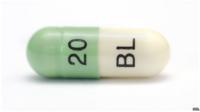
Depression and heart-disease drugs are to be tested in a trial to find treatments for Multiple Sclerosis (MS) from existing medicines.
There are currently no treatments in the secondary progressive stage of the debilitating disease.
Doctors hope the necessary drugs are already out there, but have never been tested on MS.
More than 400 people will take part in the trial at University College London and the University of Edinburgh.
Walking, balance, speech, and vision become impaired in the later stages of the disease.
There are treatments in the early phases of MS to prevent the frequency or severity of relapses. But there is nothing once the disease progresses.
Repurpose
The MS-Smart trial will test the safety and effectiveness of three drugs used in other conditions:
- Amiloride - licensed to treat heart disease
- Fluoxetine - used in depression
- Riluzole - for Motor Neurone Disease
They were identified after a review of previously published research into drugs that appear to protect the nerves from damage.
Researchers believe these treatments could slow down the progress of MS and the trial will be the first time they have been tested on such a large number of patients.
Dr Jeremy Chataway, a consultant neurologist and lead researcher on the trial based at UCL, said there was "huge unmet need".
He told the BBC: "It may be the case that we have already invented the drugs we need to treat MS.
"In the same way that aspirin was developed as a painkiller and is now used to treat stroke patients, we may well have invented the drugs that we need, we just don't know that they work in different situations than what they were invented for.
"One of the advantages is they are very cheap, and we know a great deal about them as they have been tested on millions of people around the world in their original indication.
"So it's much more of a running start when we use drugs that we aim to repurpose."
Prof Siddharthan Chandran, a clinical neurologist at the University of Edinburgh, said: "This is a landmark study that seeks to not only test three potential treatments, but also showcase a new approach to clinical trials for progressive neurological conditions."
MS-Smart is a phase two trial, making sure the drugs are safe and demonstrate sufficient effectiveness before they are tested in a larger number of people.
If successful, it could lead to new ways of using the existing drugs to modify the way the disease develops.

Sanjay Chadha

It is the first time Sanjay Chadha, 47, has had any real hope for his condition.
He has lived with progressively worsening MS for 25 years, and is now a wheelchair-user with round-the-clock care.
He said: "In recent years, as my MS has progressed into secondary progressive MS, those treatments aren't available to help stop the accumulation of disability, which just seems to weaken the whole body.
"It's very dispiriting and - I hate to use the word - depressing that there's very little that can stop the symptoms and give me some kind of control and some kind of certainty for the future.
"To have even some kind of hope that there is some kind of possibility of something that might help - it's that word 'hope'.
"It's so meaningful for somebody in my situation. Living is hard enough, but to live with no hope is even harder."
Anda sedang membaca artikel tentang
MS drug 'may already be out there'
Dengan url
http://beritaasalusil.blogspot.com/2015/04/ms-drug-may-already-be-out-there.html
Anda boleh menyebar luaskannya atau mengcopy paste-nya
MS drug 'may already be out there'
namun jangan lupa untuk meletakkan link
MS drug 'may already be out there'
sebagai sumbernya
0 komentar:
Posting Komentar